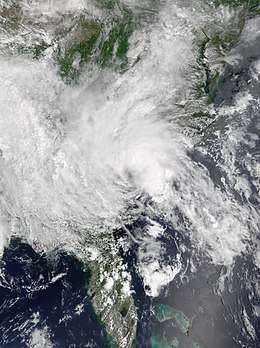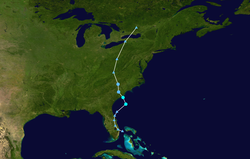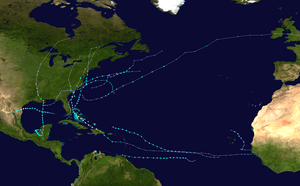Tropical Storm Bertha (2020)
Tropical Storm Bertha was a rapidly forming and short-lived off-season tropical storm that impacted the Eastern United States in late May 2020.[1] The storm and its precursor disturbance caused moderate flooding and flash flooding to Florida and South Carolina. The second named storm of the 2020 Atlantic hurricane season, Bertha formed from a trough near the east coast of Florida on May 25. The storm was not considered likely to develop at the time, but in favor of warm sea surface temperatures over the Gulf Stream, quickly became a closed low and was designated a tropical storm 3 hours before its landfall in South Carolina. The storm would then move further inland to the Northeastern United States, providing heavy rainfall and tropical storm force winds across the region as a post-tropical storm, as well as severe thunderstorms and even a tornado.
| Tropical storm (SSHWS/NWS) | |
 Bertha making landfall on the east coast of South Carolina near peak intensity on May 27 | |
| Formed | May 27, 2020 |
|---|---|
| Dissipated | May 28, 2020 |
| (Extratropical after May 28) | |
| Highest winds | 1-minute sustained: 50 mph (85 km/h) |
| Lowest pressure | 1004 mbar (hPa); 29.65 inHg |
| Fatalities | 1 total |
| Damage | > $200 million (2020 USD) |
| Areas affected | Florida, South Carolina, Pennsylvania, Ohio, North Carolina, Virginia, West Virginia, The Bahamas |
| Part of the 2020 Atlantic hurricane season | |
Meteorological history

On May 25, the NHC began to track thunderstorms associated with an elongated surface trough located over Florida and the adjoining Atlantic Ocean for potential development into a tropical cyclone, but did not expect formation due to strong upper-level winds and the high potential for the disturbance to move inland.[2] However, contrary to predictions, the system organized after moving northwards, which in turn was contributed to an increase convection and winds within the system. Based on NWS Doppler radar data from Charleston and buoy data, the NHC initiated advisories on Tropical Storm Bertha at 1200 UTC on May 27.[3] Bertha continued to rapidly strengthen despite its proximity to land.[4] One hour after the first advisory was issued, Bertha made landfall on the South Carolina coast with winds of 50 mph (80 km/h).[4] From formation until landfall, Bertha had an unusually small field of gale-force winds, stretching only 25 miles from the center.[5] Bertha began to weaken rapidly once inland, becoming a tropical depression just hours after landfall.[6] Bertha quickly degenerated to a post-tropical remnant over West Virginia at 9:00 UTC on May 28.[7] The remnants of this storm transitioned into an extratropical cyclone and enlarged in size. The cyclone, associated with a cold front brought heavy rainfall, thunderstorms and flooding to the Great Lakes region before being absorbed by a larger extratropical system a day later over southern Quebec.
Preparations
The NHC warned that regardless of development, the precursor disturbance could cause flash flooding, dangerous marine conditions, and life-threatening surf and rip currents.[8] Since the development of Bertha was very unexpected, tropical storm warnings were issued for parts of for the coast of South Carolina from Edisto Beach to South Santee River only an hour before landfall.[9] The National Hurricane Center warned that given very saturated antecedent conditions, rainfall from Bertha can produce life-threatening flash flooding and river flooding. [10]
Impact
Total economic losses from Tropical Storm Bertha were expected to be over $200 million.[11]
Florida
The precursor disturbance to Tropical Storm Bertha caused a significant, multi-day rainfall event across South Florida, with accumulations of 8–10 in (200–250 mm) across several locations, and with a maximum 72-hour accumulation of 14.19 in (360 mm) in Miami.[12] Rainfall rates of 4 in (100 mm) an hour contributed to a 24-hour total of 7.4 in (190 mm) there, more than doubling the previous daily rainfall record and resulting in the city's most significant rain event in eight years.[13] In and around Miami, the rains contributed to the inundation of homes and roadways, especially in close proximity to canals.[14] Some homes even reported partial roof collapses throughout Hallandale Beach and Hollywood as a result of the heavy precipitation.[15] Local police in El Portal asked that the South Florida Water Management District open floodgates to relieve flooding in those canals.[16]
In Hialeah, several vehicles were stranded in flooded roadways, prompting several water rescues. The mayor asked residents to remain indoors accordingly.[14] Days of heavy rainfall prompted local National Weather Service offices to issue flash flood warnings, and sporadic severe thunderstorms prompted additional advisories. An EF1 tornado caused primarily tree and fencing damage in southern Miami, though several campers were also overturned.[17] Gusts associated with the disturbance in Florida topped out at 51 mph (82 km/h) near Key Biscayne, Florida.[18] Even as the system progressed north away from Florida, the outer fringes of Tropical Storm Bertha contributed to stormy weather across the state on May 27, therefore forcing the cancellation of the planned Crew Dragon Demo-2 launch.[19]
South Carolina
Bertha brought moderate flooding to Charleston, South Carolina after it made landfall.[20] Minor power outages occurred throughout the state.[21] A drowning was reported in Myrtle Beach due to rip currents from Bertha after the storm made landfall. [22]
Virginia
Across Virginia, significant flash flooding and heavy rainfall associated with the system’s remnants caused an estimated US$1 million in damage.[23]
See also
- Other storms with the same name
- List of South Carolina hurricanes
- Tropical Storm Beryl (2012) - One of two storms that formed in May in 2012
- Tropical Storm Ana (2015) - Took a similar path
- Tropical Storm Bonnie (2016) - Another storm to have been the second storm to form in the off season
- Tropical Storm Arthur (2020) - Also dumped heavy rainfall to Florida
- Tropical Storm Emily (2017) - Similarly formed unexpectedly
References
- "Tropical Storm BERTHA". www.nhc.noaa.gov. Retrieved 2020-05-27.
- "NHC Graphical Outlook Archive". www.nhc.noaa.gov. Retrieved 2020-05-27.
- "Tropical Storm BERTHA". www.nhc.noaa.gov. Retrieved 2020-05-27.
- "Tropical Storm BERTHA". www.nhc.noaa.gov. Retrieved 2020-05-27.
- "Tropical Storm BERTHA". www.nhc.noaa.gov. Retrieved 2020-05-28.
- https://www.nhc.noaa.gov/text/refresh/MIATCPAT2+shtml/271746.shtml
- https://www.nhc.noaa.gov/text/refresh/MIAWPCAT2+shtml/280835.shtml
- "NHC Graphical Outlook Archive". www.nhc.noaa.gov. Retrieved 2020-06-02.
- "Tropical Storm BERTHA Advisory 1". www.nhc.noaa.gov. Retrieved 2020-05-28.
- Judson Jones and Theresa Waldrop (May 27, 2020). "Bertha weakens to a Tropical Depression, bringing heavy rain to South Carolina". CNN.com. Retrieved 2020-06-01.
- http://thoughtleadership.aonbenfield.com//Documents/20200609_analytics-if-may-global-recap.pdf?utm_source=slipcase&utm_medium=affiliate&utm_campaign=slipcase
- 72-hour Precipitation Reports (Updated by County) (Report). Iowa Environmental Mesonet. National Weather Service Weather Forecast Office in Miami, Florida. May 27, 2020. Retrieved May 27, 2020.
- Lois Solomon; Victoria Ballard; Rafael Olmeda; Wayne Roustan (May 27, 2020). "Bertha downgraded to tropical depression; relentless rain to continue in saturated South Florida". Sun-Sentinel. Retrieved May 27, 2020.
- Christian De La Rosa; Liane Morejon (May 26, 2020). "Steady downpours bring costly flooding across South Florida". WPLG. Retrieved May 27, 2020.
- Liane Morejon; Janine Stanwood; Christian De La Rosa; Saira Anwer; Amanda Batchelor (May 25, 2020). "Flash flood warning in effect: South Floridians deal with rainfall, tornado, dangerous roads". WPLG. Retrieved May 27, 2020.
- Brent Cameron; Sheldon Fox; Katrina Bush (May 26, 2020). "Flooded streets in Broward, Miami-Dade cause multiple cars to stall as storms batter South Florida". WSVN. Retrieved May 27, 2020.
- NWS Damage Survey for 05/25/2020 Redlands Tornado Event Update 1 (Report). Iowa Environmental Mesonet. National Weather Service Weather Forecast Office in Miami, Florida. May 26, 2020. Retrieved May 27, 2020.
- 48-hour Highest Wind Reports (Report). Iowa Environmental Mesonet. National Weather Service Weather Forecast Office in Miami, Florida. May 26, 2020. Retrieved May 27, 2020.
- Jacob Bogage; Christian Davenport (May 27, 2020). "SpaceX's Falcon 9 rocket launch is scrubbed due to weather". The Washington Post. Retrieved May 27, 2020.
- Levenson, Michael (2020-05-27). "Tropical Storm Bertha Could Cause Dangerous Flooding in the South". The New York Times. ISSN 0362-4331. Retrieved 2020-06-01.
- Collins, Jeffery (May 27, 2020). "Bertha forms, hits South Carolina coast, dissipates in a day". ABC News. Retrieved May 29, 2020.
- Summer Dashe (May 27, 2020). "Drowning reported in Myrtle Beach Wednesday after Tropical Storm Bertha hit coast". Retrieved 2020-05-30.
- Anstaett, Colter (2020-05-28). "More rain threatens parts of Henry County hit hard by weekend flash flooding". WSLS. Retrieved 2020-06-03.
External links
| Wikimedia Commons has media related to Tropical Storm Bertha (2020). |
